1 of 12
Download to read offline
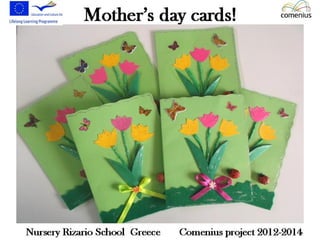
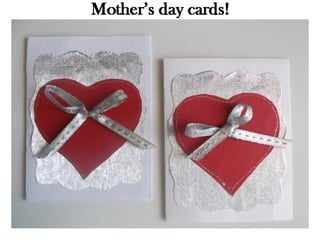
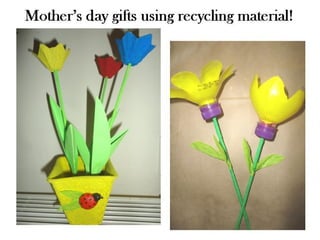
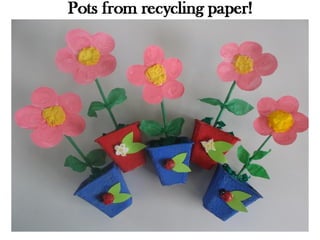
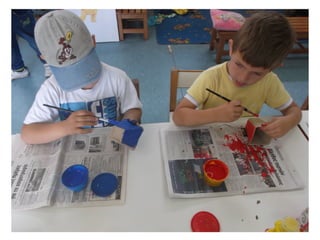
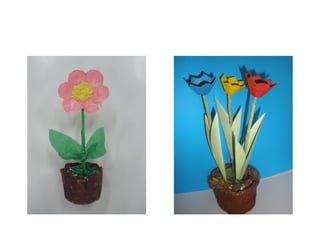
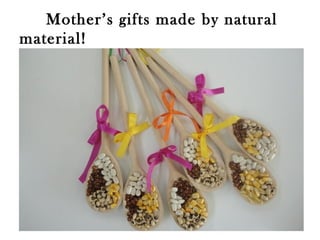
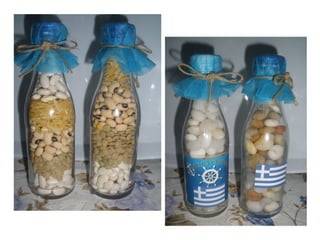
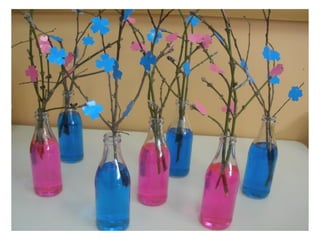
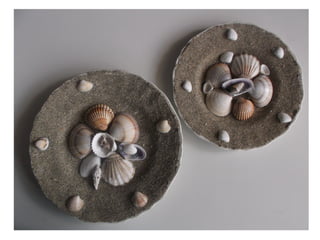
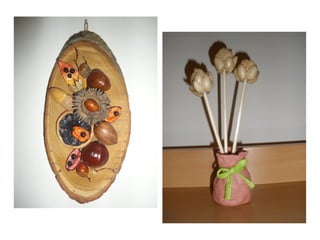
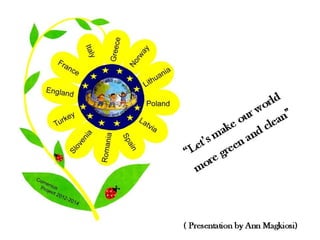
Ad
Recommended
Event for the environment day(4th of june)
Event for the environment day(4th of june)Nursery Rizario School -Greece
╠²
Event for the environment day(4th of june)Ecological perfumes
Ecological perfumesNursery Rizario School -Greece
╠²
The document discusses making homemade perfumes, cosmetics, and masks using natural ingredients like roses, herbs, fruits, and oils. It provides recipes and instructions for creating perfume, lotions, creams, and masks using ingredients like rosewater, honey, yogurt, oats, coffee, and cocoa. The goal is to produce beauty products that are healthier, more natural, and economical alternatives to commercial cosmetics.Ecological bags decorated by children
Ecological bags decorated by childrenNursery Rizario School -Greece
╠²
Ecological bags decorated by childrenThe adventure of a little bear
The adventure of a little bearNursery Rizario School -Greece
╠²
The little bear lived happily with its family in the forest, playing all day with its brother in front of their cave. It had many friends and enjoyed its carefree life. The story was created and painted by children from Nursery Rizario School as part of an initiative to make the world more green and clean.Christmastide spritides+
Christmastide spritides+Nursery Rizario School -Greece
╠²
The document discusses the Nursery Rizario school in Trikala, Greece and its participation in a Comenius project from 2012 to 2014. The school took part in a European Union funded program that promoted cooperation and student mobility among education institutions. Over those two years, the Nursery Rizario school collaborated with other European schools on shared educational activities and cultural exchanges.Meeting in greece(comenius project 2012 2014)+
Meeting in greece(comenius project 2012 2014)+Nursery Rizario School -Greece
╠²
The document summarizes a meeting that took place in Greece in August 2012. It includes visits to the Acropolis and Acropolis Museum in Athens, tours of the historical center of Athens and the city of Trikala. The group welcomed dinner under the light of the Acropolis, visited a nursery school in Trikala, tasted Greek food, and exchanged gifts and materials. They also took a trip to Meteora, a UNESCO World Heritage site, and visited the old bridge of Pili. Presentations from the meeting were held at a hotel in Trikala.World water day
World water dayNursery Rizario School -Greece
╠²
The document appears to be about a children's team project to promote environmental protection and cleanliness. A group of students from Nursery Rizario School made some kind of handiwork with the message "Let's make our world more green and clean". The overall message seems to be about the importance of water and the environment.ŽćŽü╬╣ŽāŽä╬┐Žģ╬│╬Ą╬Į╬Į╬▒ 2014
ŽćŽü╬╣ŽāŽä╬┐Žģ╬│╬Ą╬Į╬Į╬▒ 2014Nursery Rizario School -Greece
╠²
Christmas event in our School (December 2014)"Let's make a better world:more green and clean"
"Let's make a better world:more green and clean"Nursery Rizario School -Greece
╠²
The kindergarten of Rizario in Greece emphasizes creating a greener and cleaner world through various educational activities focused on environmental protection and sustainability. Children participated in projects such as planting trees, learning about recycling, and promoting a meatless diet, while also engaging in international collaborations via digital platforms. The school received several awards for its efforts, showcasing the importance of cooperation, children's rights, and the integration of technology in learning.Profile of Kindergarten of Rizario
Profile of Kindergarten of Rizario Nursery Rizario School -Greece
╠²
The Kindergarten of Rizario, located in Greece, provides inclusive, innovative education aimed at holistic development, integrating technology, STEAM, and robotics into its curriculum. The school actively participates in numerous Erasmus+ projects and international collaborations, receiving multiple awards while promoting environmental awareness and community involvement. With a focus on staff training and parent engagement, it aims to foster digital and media literacy among students, educators, and families.Our environmental book (presentation).pptx
Our environmental book (presentation).pptxNursery Rizario School -Greece
╠²
The kindergarten of Rizario, Greece, promotes environmental awareness through their book. They encourage the use of eco-friendly cleaning products. The children's positive results are highlighted as remarkable.Erasmus +KA2 project exhibition
Erasmus +KA2 project exhibitionNursery Rizario School -Greece
╠²
The document outlines a series of project exhibitions and presentations related to the Erasmus+ project on ICT and robotics in preschool education conducted by the Kindergarten of Rizario in Trikala, Greece from 2019 to 2022. It highlights various events including training, exhibitions, and presentations to parents, as well as participation in competitions. The European Commission's support for the project is acknowledged, although they do not endorse its contents.Erasmus + project dissemination via local press.pptx
Erasmus + project dissemination via local press.pptxNursery Rizario School -Greece
╠²
The document contains announcements from local press regarding a project linked to the website Trikalaerevna. It includes a presentation by the projectŌĆÖs coordinator, Anna Magkiosi, which outlines key details and updates. The focus is on informing the community about the project's progress and significance.Erasmus+ project's exhibition (March 2022)
Erasmus+ project's exhibition (March 2022)Nursery Rizario School -Greece
╠²
The document details a final project exhibition from the Rizario Kindergarten of Trikala, Greece, focusing on the integration of ICT and robotics in preschool education to enhance learning. Presented by project coordinator Anna Magkiosi in March 2022, it notes that the publication's content reflects the authors' views, not those of the European Commission, which supported its production. This initiative aims to make learning more attractive for young students.Announcements of newspapers
Announcements of newspapersNursery Rizario School -Greece
╠²
This document describes an Erasmus+ project from 2018 to 2020 called "My culture, your culture, our culture". The project received support from the European Commission for its publication, but the Commission does not endorse the content which only reflects the views of the authors.Presentation of second year project's activities
Presentation of second year project's activitiesNursery Rizario School -Greece
╠²
The document outlines the activities of the 2nd-year Erasmus+ project titled 'My Culture, Your Culture, Our Culture' during the COVID-19 pandemic. Despite challenges, children engaged in project activities from home with family and teacher support, producing creative works for various celebrations. A dissemination event was held online on July 6, 2020, to share the project's progress.Activities during Erasmus + project's elongation
Activities during Erasmus + project's elongation Nursery Rizario School -Greece
╠²
The document outlines the activities of the Erasmus+ project 'My Culture, Your Culture, Our Culture' from 2020 to 2021, including various educational and cultural events such as dramatizations, traditional crafts, and performances. It highlights adaptations made during the COVID-19 pandemic, like distance learning, and mentions local press announcements. The project aimed to promote tolerance and acceptance through engaging educational experiences.Painting the almont tree
Painting the almont tree Nursery Rizario School -Greece
╠²
Children of Kindergarten of Rizario of Trikala of Greece paint the Almont tree and learn the myth according to Greek folk tradition in the framework of Erasmus+ project "My culture, your culture, our culture"
Performance of karagiozis
Performance of karagiozisNursery Rizario School -Greece
╠²
Erasmus+ project "My culture, your culture, our culture"
Children watch the performance of Karagiozis and make figuresEvolution of cultivation
Evolution of cultivation Nursery Rizario School -Greece
╠²
Erasmus project 2018-2020
"My culture, your culture , our culture"
Children's work and paintings on the topicMore Related Content
Viewers also liked (10)
Meeting in greece(comenius project 2012 2014)+
Meeting in greece(comenius project 2012 2014)+Nursery Rizario School -Greece
╠²
The document summarizes a meeting that took place in Greece in August 2012. It includes visits to the Acropolis and Acropolis Museum in Athens, tours of the historical center of Athens and the city of Trikala. The group welcomed dinner under the light of the Acropolis, visited a nursery school in Trikala, tasted Greek food, and exchanged gifts and materials. They also took a trip to Meteora, a UNESCO World Heritage site, and visited the old bridge of Pili. Presentations from the meeting were held at a hotel in Trikala.World water day
World water dayNursery Rizario School -Greece
╠²
The document appears to be about a children's team project to promote environmental protection and cleanliness. A group of students from Nursery Rizario School made some kind of handiwork with the message "Let's make our world more green and clean". The overall message seems to be about the importance of water and the environment.ŽćŽü╬╣ŽāŽä╬┐Žģ╬│╬Ą╬Į╬Į╬▒ 2014
ŽćŽü╬╣ŽāŽä╬┐Žģ╬│╬Ą╬Į╬Į╬▒ 2014Nursery Rizario School -Greece
╠²
Christmas event in our School (December 2014)More from Nursery Rizario School -Greece (20)
"Let's make a better world:more green and clean"
"Let's make a better world:more green and clean"Nursery Rizario School -Greece
╠²
The kindergarten of Rizario in Greece emphasizes creating a greener and cleaner world through various educational activities focused on environmental protection and sustainability. Children participated in projects such as planting trees, learning about recycling, and promoting a meatless diet, while also engaging in international collaborations via digital platforms. The school received several awards for its efforts, showcasing the importance of cooperation, children's rights, and the integration of technology in learning.Profile of Kindergarten of Rizario
Profile of Kindergarten of Rizario Nursery Rizario School -Greece
╠²
The Kindergarten of Rizario, located in Greece, provides inclusive, innovative education aimed at holistic development, integrating technology, STEAM, and robotics into its curriculum. The school actively participates in numerous Erasmus+ projects and international collaborations, receiving multiple awards while promoting environmental awareness and community involvement. With a focus on staff training and parent engagement, it aims to foster digital and media literacy among students, educators, and families.Our environmental book (presentation).pptx
Our environmental book (presentation).pptxNursery Rizario School -Greece
╠²
The kindergarten of Rizario, Greece, promotes environmental awareness through their book. They encourage the use of eco-friendly cleaning products. The children's positive results are highlighted as remarkable.Erasmus +KA2 project exhibition
Erasmus +KA2 project exhibitionNursery Rizario School -Greece
╠²
The document outlines a series of project exhibitions and presentations related to the Erasmus+ project on ICT and robotics in preschool education conducted by the Kindergarten of Rizario in Trikala, Greece from 2019 to 2022. It highlights various events including training, exhibitions, and presentations to parents, as well as participation in competitions. The European Commission's support for the project is acknowledged, although they do not endorse its contents.Erasmus + project dissemination via local press.pptx
Erasmus + project dissemination via local press.pptxNursery Rizario School -Greece
╠²
The document contains announcements from local press regarding a project linked to the website Trikalaerevna. It includes a presentation by the projectŌĆÖs coordinator, Anna Magkiosi, which outlines key details and updates. The focus is on informing the community about the project's progress and significance.Erasmus+ project's exhibition (March 2022)
Erasmus+ project's exhibition (March 2022)Nursery Rizario School -Greece
╠²
The document details a final project exhibition from the Rizario Kindergarten of Trikala, Greece, focusing on the integration of ICT and robotics in preschool education to enhance learning. Presented by project coordinator Anna Magkiosi in March 2022, it notes that the publication's content reflects the authors' views, not those of the European Commission, which supported its production. This initiative aims to make learning more attractive for young students.Announcements of newspapers
Announcements of newspapersNursery Rizario School -Greece
╠²
This document describes an Erasmus+ project from 2018 to 2020 called "My culture, your culture, our culture". The project received support from the European Commission for its publication, but the Commission does not endorse the content which only reflects the views of the authors.Presentation of second year project's activities
Presentation of second year project's activitiesNursery Rizario School -Greece
╠²
The document outlines the activities of the 2nd-year Erasmus+ project titled 'My Culture, Your Culture, Our Culture' during the COVID-19 pandemic. Despite challenges, children engaged in project activities from home with family and teacher support, producing creative works for various celebrations. A dissemination event was held online on July 6, 2020, to share the project's progress.Activities during Erasmus + project's elongation
Activities during Erasmus + project's elongation Nursery Rizario School -Greece
╠²
The document outlines the activities of the Erasmus+ project 'My Culture, Your Culture, Our Culture' from 2020 to 2021, including various educational and cultural events such as dramatizations, traditional crafts, and performances. It highlights adaptations made during the COVID-19 pandemic, like distance learning, and mentions local press announcements. The project aimed to promote tolerance and acceptance through engaging educational experiences.Painting the almont tree
Painting the almont tree Nursery Rizario School -Greece
╠²
Children of Kindergarten of Rizario of Trikala of Greece paint the Almont tree and learn the myth according to Greek folk tradition in the framework of Erasmus+ project "My culture, your culture, our culture"
Performance of karagiozis
Performance of karagiozisNursery Rizario School -Greece
╠²
Erasmus+ project "My culture, your culture, our culture"
Children watch the performance of Karagiozis and make figuresEvolution of cultivation
Evolution of cultivation Nursery Rizario School -Greece
╠²
Erasmus project 2018-2020
"My culture, your culture , our culture"
Children's work and paintings on the topicCultural education in kindergarten
Cultural education in kindergartenNursery Rizario School -Greece
╠²
The document provides a comprehensive overview of the significance of cultural education in preschool, emphasizing its role in fostering cultural awareness and identity among young children across Europe. It highlights various cultural activities from participating schools in five European countries, aimed at enhancing children's understanding of their heritage, promoting social cohesion, and developing respect for diverse cultures. Ultimately, the guide aims to equip children with a sense of European identity and the skills necessary for peaceful coexistence and mutual appreciation in a multicultural environment.Renewal of curriculum in Kindergarten
Renewal of curriculum in Kindergarten Nursery Rizario School -Greece
╠²
The document discusses the renewal of kindergarten curriculum to integrate cultural and museum education, responding to the rapid changes in 21st-century educational needs. It emphasizes the importance of collaborative and experiential learning methods that foster children's critical thinking, creativity, and cultural awareness. The project aims to enhance children's understanding of cultural heritage while developing their social skills and European identity through cultural activities and museum visits.Erasmus +project's exhibitions
Erasmus +project's exhibitions Nursery Rizario School -Greece
╠²
This document discusses an Erasmus+ project from 2018-2020 hosted by Kindergarten of Rizario in Trikala, Greece. The project's theme was "My culture, your culture, our culture" and involved exhibitions showcasing different cultures. Congratulations letters were also mentioned.Dissemination activities
Dissemination activitiesNursery Rizario School -Greece
╠²
This document summarizes the events and activities of the Kindergarten of Rizario in Trikala, Greece related to their eTwinning project. It lists 7 in-person training events in various European countries from 2018-2020 as well as numerous online virtual events from 2020-2021 including online project trainings, participation in conferences on their project topic, an online symposium, and dissemination of their project outcomes. The document also mentions cultural events hosted by the school and participation in the European School Academy.Presentation of all project 's activities
Presentation of all project 's activitiesNursery Rizario School -Greece
╠²
This document describes an Erasmus+ project called "My Culture, Your Culture, Our Culture" involving kindergartens in Greece, Portugal, Poland, Lithuania, and Italy. The goals of the two-year project were to help young children understand cultural heritage through activities and raise awareness of different cultures. Teachers and students collaborated online and in person on activities focused on traditions, customs, foods, and languages of the participating countries. The final products included e-books, websites, and other digital materials sharing what was learned.Creation of school museum
Creation of school museumNursery Rizario School -Greece
╠²
The document discusses the creation of a museum at a kindergarten school in Trikala, Greece as part of an Erasmus+ project from 2018-2020 called "My culture, your culture, our culture". The museum was created to showcase the project's outcomes and is mentioned in an article from the local Trikala newspaper "EREYNA". The museum at the school aims to display the results of the cultural exchange project between participating schools.Rizario Kindergarten : Cooperation with local community
Rizario Kindergarten : Cooperation with local community Nursery Rizario School -Greece
╠²
The Erasmus+ project 'My Culture, Your Culture, Our Culture' at Rizario Kindergarten in Trikala, Greece, emphasizes cooperation with parents and the local community, contributing to the project's success. Children actively engaged in cultural activities, including visits to museums and participation in traditional arts, fostering an understanding of their own heritage and the diversity of European cultures. The initiative also involved collaboration with local authorities and educational institutions, enhancing cultural consciousness and reinforcing both national and European identities.Cultural activities in Rizario Kindergarten of Trikala, Greece
Cultural activities in Rizario Kindergarten of Trikala, GreeceNursery Rizario School -Greece
╠²
Five schools from northern and southern Europe collaborated on a cultural program for their kindergarten students. The program gave the children opportunities to learn about the cultures of other European countries through activities like visiting museums, sharing traditions, and communicating with partner students. The goals were to develop European identity and citizenship qualities like tolerance. Some example activities included learning about each country's history, customs, food, and visiting local historical sites and museums. The program aimed to strengthen both national and European identity among the young students.Ad
Mother's day cards!
- 7. MotherŌĆÖs gifts made by natural material!
